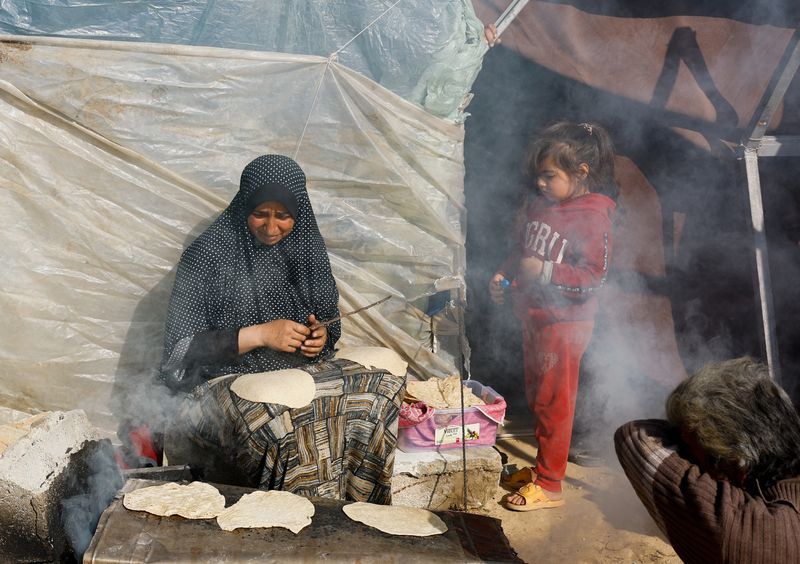By Tom Perry and Maayan Lubell
BEIRUT/JERUSALEM (Reuters) - Israel's orders to Gaza's residents to move ever further south towards the Egyptian border during its offensive and the dire humanitarian situation have sparked Arab and U.N. concerns that Palestinians may eventually be driven over the border.
Israel denies having any plans to push Palestinians into Egypt's Sinai Peninsula as it pursues its goal of destroying Hamas following the group's devastating Oct. 7 attack on Israeli soil. It says it has told Gazans to move for their own safety.
WHAT IS BEHIND THE CONCERNS?
Palestinians have long been haunted by what they call the "Nakba", or catastrophe, when 700,000 of them were dispossessed from their homes when Israel was created in 1948.
Many were driven out or fled to neighbouring Arab states, including to Jordan, Syria and Lebanon, where many of them or their descendants still live in refugee camps. Some went to Gaza. Israel disputes the account that they were forced out.
The latest conflict has seen an unprecedented Israeli bombardment and land offensive in Gaza, devastating urban areas throughout the enclave. Palestinians and U.N. officials say there are no longer any safe areas inside Gaza to seek shelter.
WHAT HAS HAPPENED DURING THIS CONFLICT?
Before Israel launched its ground offensive in Gaza, it initially told Palestinians in north Gaza to move to what it said were safe areas in the south. As the offensive expanded, Israel told them to head further south towards Rafah, located next to Egypt, the only country apart from Israel to share a border with the enclave, which is only 40 km (24.85 miles) long and a few kilometres wide.
According to U.N. estimates, up to 85% of the 2.3 million people in Gaza - one of the most densely populated areas of the world - have already been displaced from their homes and are now crammed in an ever smaller area near the border.
WHAT HAS HAPPENED DURING PREVIOUS GAZA BORDER INCIDENTS?
There has been no precedent for people fleeing en masse from Gaza during conflicts and flare ups with Israel in recent years, although no previous war has been this fierce. However, there have been incidents when Gaza's border with Egypt was breached, although those crossing numbered hundreds or thousands, and those people were not seeking shelter or to stay.
Following Israel's withdrawal from the Gaza Strip in 2005, Palestinians breached the fence, with some clambering over with make-shift ramps and using ropes. At one place, Palestinian militants rammed a concrete barrier to break a hole.
Hamas breached the frontier again in 2008, challenging a blockade imposed by Israel and Egypt after the group seized control of the Gaza Strip in 2007 from the West Bank-based Palestinian Authority. The border remained breached for about 10 days before Egypt resealed it.
COULD A MAJOR DISPLACEMENT HAPPEN IN THIS CONFLICT?
Many Palestinians inside Gaza have said they would not leave even if they could because they fear it might lead to another permanent displacement in a repeat of 1948. Egypt, meanwhile, has kept the border firmly closed except to let a few thousand foreigners, dual nationals and a handful of others leave Gaza.
Egypt and other Arabs strongly oppose any attempt to push Palestinians over the border.
Yet, the scale of this conflict eclipses other Gaza crises or flare up in past decades, and the humanitarian disaster deepens for Palestinians by the day, leaving them without enough food or water, while few hospitals still function.
WHAT ARE ARAB STATES AND THE U.N. SAYING?
From the earliest days of the conflict, Arab governments, particularly Israel's neighbours Egypt and Jordan, have said Palestinians must not be driven from land where they want to make a future state, which would include the West Bank and Gaza.
Like Palestinians, they fear any mass movement across the border would further undermine prospects for a "two-state solution" - the idea of creating a state of Palestine next to Israel - and leave Arab nations dealing with the consequences.
As the humanitarian crisis has worsened, top U.N. officials have added their voices to concerns about a mass displacement.
"I expect public order to completely break down soon and an even worse situation could unfold including epidemic diseases and increased pressure for mass displacement into Egypt," U.N. Secretary General Antonio Guterres said on Dec. 10.
Philippe Lazzarini, head of the U.N. Palestinian refugee agency UNRWA, wrote in the Los Angeles Times on Dec. 9 that "developments we are witnessing point to attempts to move Palestinians into Egypt, regardless of whether they stay there or are resettled elsewhere."
WHAT HAVE ISRAEL'S GOVERNMENT AND ITS POLITICIANS SAID?
The Israeli government says it is only telling Palestinians to leave their homes temporarily for their safety but comments by some Israeli politicians - including some close to the government - have stoked Palestinian and Arab fears of a new Nakba.
Asked about the Israel Defense Forces (IDF) offensive and the displacement of Gazans, Israeli Agriculture Minister Avi Dichter told Israel's Channel 12 on Nov. 11: "This is Gaza's Nakba, operationally there's no way to conduct a war the way the IDF wants to conduct it inside Gaza territories while the masses are between the tanks and soldiers."

Dichter is a member of Prime Minister Benjamin Netanyahu's Likud party and is also a minister in the security cabinet.
After Jordanian Foreign Minister Ayman Safadi said on Dec. 10 that Israel's offensive was "a systematic effort to empty Gaza of its people," Israeli government spokesperson Eylon Levy called those comments "outrageous and false accusations."